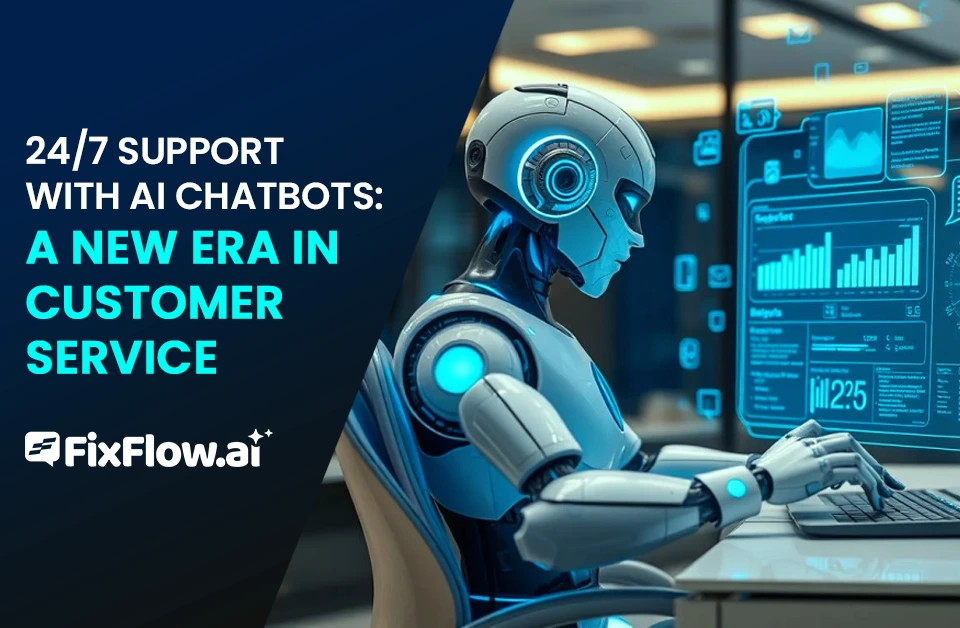24/7 Support With AI Chatbots: A New Era in Customer Service
You’re entering a new era of customer service with AI chatbots at the forefront, offering constant 24/7 support. These chatbots enhance your experience by providing real-time, personalized assistance that’s always available. They efficiently handle multiple queries simultaneously, giving you immediate support without waiting. Your interactions remain relevant and satisfying with their ability to adapt and learn. While challenges like ensuring seamless human handoff and robust data security exist, the benefits are undeniable. Ready for insights into their applications in various industries and the future potential they hold for service optimization?
Revolutionizing Customer Interaction
In today’s fast-paced digital landscape, AI chatbots fundamentally transform how customers interact with businesses. By leveraging artificial intelligence, these chatbots offer a seamless customer experience that enhances user interaction. Companies are integrating chatbots to provide real-time assistance, ensuring that customers receive immediate responses to their queries. This integration streamlines user interaction and personalizes the customer journey, making each interaction feel tailored and efficient.
When you engage with an AI-powered chatbot, you tap into a system designed to learn and adapt. The chatbot’s ability to understand and process natural language means it can easily handle a wide range of customer inquiries. This level of sophistication in chatbot integration fosters a more interactive and engaging user experience. You’ll notice that the assistance is timely and contextually relevant, further elevating overall customer satisfaction.
Embracing AI chatbots transforms how you connect with businesses, offering a blend of immediacy and personalization that’s hard to match. As chatbots continue to evolve, the future of customer interaction looks increasingly promising, driven by advancements in artificial intelligence.
Benefits of AI-Powered Support
AI-powered support offers significant advantages that transform the customer service landscape. With 24/7 availability, AI chatbots ensure customers can receive assistance anytime, anywhere. This constant accessibility increases customer satisfaction, as clients appreciate immediate responses to their inquiries. AI chatbots help build trust by providing real-time assistance, resulting in better customer retention.
Moreover, the cost efficiency of AI-powered support is undeniable. Implementing a chatbot framework significantly reduces operational costs, as fewer human agents are needed to handle basic queries. This allows your team to focus on more complex issues that require a human touch, improving overall service quality. Scalability is another benefit, as AI chatbots can handle multiple interactions simultaneously without compromising performance.
AI chatbots also empower customers through self-service options. By utilizing a knowledge base and automation workflow, chatbots enable users to find solutions independently, enhancing their experience and fostering independence. This self-service capability improves efficiency and contributes to customer satisfaction, as users feel more in control.
Incorporating AI-powered support into your customer service strategy can revolutionize client engagement and drive cost-effective, scalable solutions.
Challenges and Considerations
While AI-powered support offers numerous benefits, it’s important to recognize the challenges and considerations of implementing AI chatbots. One key challenge is ensuring a smooth human-agent handoff. When a chatbot can’t handle complex customer queries, it’s crucial to transition seamlessly to a human agent to maintain customer satisfaction. If this process isn’t managed well, it can lead to frustration and a poor user experience.
Providing multilingual support is another significant consideration. Your customer base is likely diverse, and AI chatbots must be equipped to communicate effectively in multiple languages. This requires sophisticated language processing capabilities and continuous updates to meet evolving linguistic needs.
Data security is also paramount. With increasing cyber threats, safeguarding customer data during chatbot interactions is essential. Ensuring compliance with privacy regulations and implementing robust security measures will protect sensitive information and build trust.
Finally, feedback collection is vital for continuous improvement. As customers interact with chatbots, gathering and analyzing their feedback can help optimize services and address shortcomings. By focusing on these challenges and considerations, you can enhance the effectiveness and reliability of AI chatbots in your customer service strategy.
Real-World Applications
Real-world applications of AI chatbots are transforming customer service across various industries, providing businesses with innovative solutions to enhance customer interactions. By leveraging artificial intelligence, companies can offer efficient and effective customer support. You’ll find AI chatbots in sectors like e-commerce, finance, healthcare, and travel, which handle routine inquiries with automated responses. This speeds up response times and frees up human agents for more complex issues.
In e-commerce, for instance, AI chatbots can assist customers in tracking orders, answering product questions, and processing returns. This level of user engagement is crucial for maintaining customer satisfaction. In the financial sector, chatbots are used for account inquiries and transaction assistance, providing a secure and seamless customer experience. Healthcare providers implement chatbots to schedule appointments and provide basic information, enhancing patient interactions.
An essential aspect of these applications is the integration API, which allows chatbots to connect effortlessly with existing systems. This integration ensures consistent customer support and data synchronization across platforms. By embracing these technologies, businesses can optimize their services, improving customer loyalty and operational efficiency.
Future of AI in Customer Service
As AI chatbots continue to revolutionize customer service across various industries, their potential is just beginning to be tapped. With advancements in artificial intelligence, chatbots are set to transform customer interactions even further. Chatbots evolve from their current roles into more sophisticated entities that can predict customer needs and offer proactive support. Imagine a world where your chatbot responds to questions and anticipates issues before they arise, enhancing customer retention by ensuring satisfaction from the get-go.
The future holds incredible possibilities for automation workflow, where AI seamlessly integrates with existing systems to streamline operations. This integration doesn’t just stop at efficiency; it plays a crucial role in service optimization. By analyzing customer interactions, AI can continuously improve its responses, learning from each exchange to provide better solutions in the future.
You’ll also notice a shift toward more personalized experiences. AI chatbots will use data insights to tailor interactions, making each customer feel valued. As you embrace these innovations, remember that the future of customer service lies in leveraging AI’s full potential to create a seamless, efficient, and highly personalized support system.
Frequently Asked Questions
How Do AI Chatbots Handle Complex Customer Inquiries?
AI chatbots shine when handling complex customer inquiries by leveraging advanced natural language processing and machine learning. They analyze queries in real time, pulling from a vast database of information to provide accurate responses. If a question is too intricate, these bots can seamlessly transfer the conversation to a human agent, ensuring you get the needed help. Plus, their ability to learn from interactions constantly improves their problem-solving skills.
What Limitations Do AI Chatbots Face in Understanding Customer Emotions?
You may have noticed that AI chatbots struggle to understand emotions. They rely heavily on algorithms and data, which means they can misinterpret sarcasm, humor, or subtle nuances in tone. Even with sentiment analysis, they’re not perfect at gauging emotional context, leading to responses that can feel robotic or insensitive. Recognizing these limitations and considering integrating human oversight for more complex emotional interactions is important.
How Do AI Chatbots Maintain a Brand’s Voice in Interactions?
AI chatbots maintain your brand’s voice by utilizing a well-designed bot persona and consistent language style that reflects your brand’s identity. They’re programmed with specific guidelines and tone of voice to ensure interactions align with your brand values. By implementing machine learning, chatbots can adapt and refine their responses based on user interactions, ensuring they consistently convey the right message and maintain brand consistency across all customer engagements.
Are AI Chatbots Capable of Learning From Each Customer Interaction?
You may wonder if AI chatbots can learn from each customer interaction. They absolutely can. Through machine learning and natural language processing, chatbots analyze conversations to improve their responses over time. Gathering data from each interaction, they adapt to understand user preferences better and provide more accurate assistance. This continuous learning process helps refine their performance, making customer interactions more personalized and efficient with each engagement.
How Do Companies Ensure AI Chatbot Responses Are Accurate and Reliable?
You want your AI chatbot’s responses to be accurate and reliable, right? Companies achieve this by continuously training chatbots with updated data and using advanced machine learning algorithms. Regularly monitoring interactions helps refine responses. They also implement feedback loops where you, the user, can provide input, ensuring the bot evolves. Rigorous testing and deploying sentiment analysis ensure the chatbot understands and responds appropriately, maintaining trust and satisfaction.







